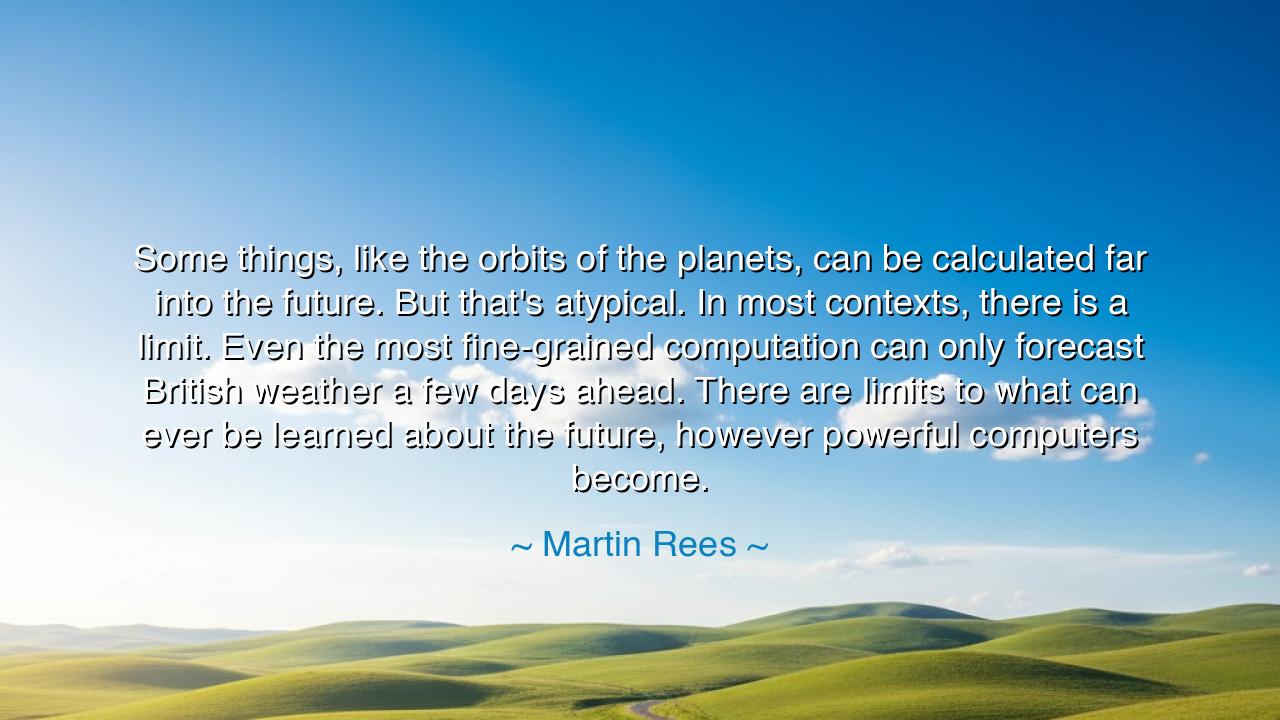
Some things, like the orbits of the planets, can be calculated
Some things, like the orbits of the planets, can be calculated far into the future. But that's atypical. In most contexts, there is a limit. Even the most fine-grained computation can only forecast British weather a few days ahead. There are limits to what can ever be learned about the future, however powerful computers become.






“Some things, like the orbits of the planets, can be calculated far into the future. But that's atypical. In most contexts, there is a limit. Even the most fine-grained computation can only forecast British weather a few days ahead. There are limits to what can ever be learned about the future, however powerful computers become.” — Martin Rees
Hear now the voice of Martin Rees, a sage of the stars, who peers into both the infinite and the intimate. His words are not merely about science, but about wisdom—about the boundary between what humanity can know and what it must humbly accept. In his reflection, he reminds us that even in an age of boundless data and machines of immense power, there remains an eternal truth: the future is not ours to command. He speaks as one who has watched the heavens move in perfect order and yet has seen the storms of Earth defy prediction. For though we may chart the orbits of the planets with flawless precision, the tides of life, the chaos of weather, and the will of human hearts remain beyond all formulas.
Since ancient times, humankind has sought to pierce the veil of tomorrow. The prophets read omens in the flight of birds, the philosophers studied cycles of nature, and the mathematicians charted the stars, believing that if one could only know enough, one could know everything. But Rees, standing at the pinnacle of scientific understanding, reminds us of the limits of foresight. Even now, when the world’s most powerful computers hum with the calculations of billions, they cannot predict the British weather beyond a handful of days. For in the dance of clouds and currents lies the law of chaos—that small causes birth vast consequences, and even the slightest change may redirect the entire flow of time.
Consider the story of Edward Lorenz, the meteorologist who discovered the “butterfly effect.” While studying weather models in the 1960s, he found that a minuscule rounding error—no greater than the flap of a butterfly’s wing—could transform the entire forecast. From this revelation, a new truth emerged: the universe is not a clock, wound and predictable, but a living web of interwoven forces. The smallest tremor reverberates through eternity. Lorenz’s discovery, echoed now in Rees’s words, teaches us that knowledge has boundaries, and that humility is the beginning of wisdom.
Rees speaks of the planets, whose movements can be foretold for millennia, yet he contrasts this with the unpredictability of the world we inhabit. The heavens obey majestic order; the Earth, teeming with life and motion, obeys the law of change. His message is not despair, but reverence—for in these limits lies the beauty of existence. Were everything knowable, life would be mere machinery. It is the mystery of tomorrow, the uncertainty of the next breath, that gives meaning to our choices, courage to our acts, and hope to our hearts.
Even the greatest computers—those cold mirrors of human intellect—cannot escape this truth. They may simulate, predict, approximate; yet they too are born of the same chaotic world they seek to master. They can never rise above the uncertainty written into the fabric of the cosmos. And so, Rees’s wisdom calls to us: there are limits to what can ever be learned about the future. Not because we are foolish, but because reality itself guards its depths. The future is not a locked door waiting for the right key—it is an unfolding path, created as we walk it.
This understanding invites not resignation, but balance. Let us pursue knowledge with zeal, but wear humility as our crown. Let us study the stars and model the weather, yet remember that no computation can predict the beating of a single human heart, or the moment when love, or sorrow, will arrive unannounced. We must learn to dwell at peace with uncertainty, to labor not for mastery of the future, but for wisdom in the present.
So, my children of the modern age, take this lesson to heart. Seek truth, but do not seek omniscience. Plan for tomorrow, but live for today. Do not despair that the future cannot be fully known—it is this very mystery that makes life alive. As Martin Rees has taught, the stars may move in predictable harmony, but the winds of Earth—and the destinies of men—belong to a realm beyond calculation. Embrace that mystery, and you will find that wonder, not certainty, is the truest light by which to live.






AAdministratorAdministrator
Welcome, honored guests. Please leave a comment, we will respond soon